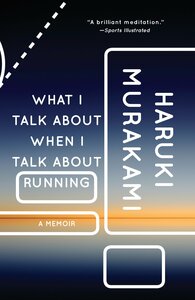Take a photo of a barcode or cover
reflective
slow-paced
Haruki Murakami's nonfiction book. I have been trying to read this book for a long time. Murakami is a long-distance runner and this is his memoir on running. Sharing his experiences on running, he also shared a few writing tips in the book.
Murakami starts the book by saying, suffering is optional. He writes, 'hurt is inevitable but suffering is optional.'
Murakami maintained a journal to jot down his running experiences, he also maintained logs of how many miles he runs in a week. Murakami chose to run in his late forties and he decided to run the classic Marathon in reverse, i.e Athens to Marathon. 26.2 Miles. He narrated his experience well in this memoir.
'I run in a void,' Murakami says, discussing the philosophical thought on how there's no void and yet there's void in thoughts while running. There's a lot of imagery in his writing, making us witness his marathon and triathlon experiences.
https://abhinayrenny.blogspot.com/2020/04/book-what-i-talk-about-when-i-talk.html
Murakami starts the book by saying, suffering is optional. He writes, 'hurt is inevitable but suffering is optional.'
Murakami maintained a journal to jot down his running experiences, he also maintained logs of how many miles he runs in a week. Murakami chose to run in his late forties and he decided to run the classic Marathon in reverse, i.e Athens to Marathon. 26.2 Miles. He narrated his experience well in this memoir.
'I run in a void,' Murakami says, discussing the philosophical thought on how there's no void and yet there's void in thoughts while running. There's a lot of imagery in his writing, making us witness his marathon and triathlon experiences.
https://abhinayrenny.blogspot.com/2020/04/book-what-i-talk-about-when-i-talk.html
inspiring
reflective
Confession time. I’ve never read anything by Haruki Murakami despite owning quite a lot of his backlist. Furthermore, I’m not a runner, so delving into What I Talk About When I Talk About Running might seem like an unusual choice for me to make. But I received this as a “Secret Santa” gift at my book group earlier in the month, and casting about for something light and easy to read last week, this one filled the gap. I found it surprisingly entertaining.
The book is essentially a memoir about Murakami’s long affair with long-distance running. At the time he wrote the book in 2007, he’d competed in some 26 marathons, one for every year of his amateur running career, so I suspect the total may now be higher.
Interspersed with this thoughts and philosophy on running, Murakami also shares his thoughts on writing (he became a full-time novelist in 1982 after he sold the jazz bar he owned and managed) and the way the two inform each other.
To read my review in full, please visit my blog.
The book is essentially a memoir about Murakami’s long affair with long-distance running. At the time he wrote the book in 2007, he’d competed in some 26 marathons, one for every year of his amateur running career, so I suspect the total may now be higher.
Interspersed with this thoughts and philosophy on running, Murakami also shares his thoughts on writing (he became a full-time novelist in 1982 after he sold the jazz bar he owned and managed) and the way the two inform each other.
To read my review in full, please visit my blog.
adventurous
informative
inspiring
reflective
medium-paced
This book is exactly what you think it is, a memoir by a popular (and good) author on what running means to him.
Though it may not appeal to everyone, this book attracted me because I love books, reading, writing, and running. Also, Murakami is a new author to me so I'm still learning about him.
I wish every one of my favorite authors wrote a memoir because I would love to align my habits with theirs. Here there is some evident and pre-existing overlap.
Obviously, the book isn't just about running. Murakami describes his life in Boston, and in Japan, competitions, and ultra-marathons. He speaks about running habits and aging, how he can no longer maintain his marathon times as an older man and thus is more interested in triathlons. He describes operating a bar with his wife when he was younger, his interest in baseball, and sharing a track with Olympian runners.
Like in his other writings, Murakami is accessible. He uses the personal I. This is a plus because I've never understood why it's considered bad form. There's nothing complicated or high-brow and you won't feel any sort of chasm between you and the author. There's no posing.
I like the book for what it is - a window into the life of a man I respect. But unless you're interested in Murakami's life, this book doesn't hold any gems.
Though it may not appeal to everyone, this book attracted me because I love books, reading, writing, and running. Also, Murakami is a new author to me so I'm still learning about him.
I wish every one of my favorite authors wrote a memoir because I would love to align my habits with theirs. Here there is some evident and pre-existing overlap.
Obviously, the book isn't just about running. Murakami describes his life in Boston, and in Japan, competitions, and ultra-marathons. He speaks about running habits and aging, how he can no longer maintain his marathon times as an older man and thus is more interested in triathlons. He describes operating a bar with his wife when he was younger, his interest in baseball, and sharing a track with Olympian runners.
Like in his other writings, Murakami is accessible. He uses the personal I. This is a plus because I've never understood why it's considered bad form. There's nothing complicated or high-brow and you won't feel any sort of chasm between you and the author. There's no posing.
I like the book for what it is - a window into the life of a man I respect. But unless you're interested in Murakami's life, this book doesn't hold any gems.
reflective
medium-paced
emotional
informative
reflective
medium-paced
emotional
lighthearted
medium-paced
I had a good time.




